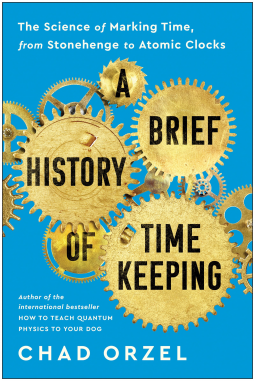
A Brief History of Timekeeping
The Science of Marking Time, from Stonehenge to Atomic Clocks
by Chad Orzel
This title was previously available on NetGalley and is now archived.
Send NetGalley books directly to your Kindle or Kindle app
1
To read on a Kindle or Kindle app, please add kindle@netgalley.com as an approved email address to receive files in your Amazon account. Click here for step-by-step instructions.
2
Also find your Kindle email address within your Amazon account, and enter it here.
Pub Date Jan 25 2022 | Archive Date Feb 07 2022
Talking about this book? Use #ABriefHistoryofTimekeeping #NetGalley. More hashtag tips!
Description
". . . inherently interesting, unique, and highly recommended addition to personal, professional, community, college, and academic library Physics of Time & Scientific Measurement history collections, and supplemental curriculum studies lists.” —Midwest Book Review
"A wonderful look into understanding and recording time, Orzel’s latest is appropriate for all readers who are curious about those ticks and tocks that mark nearly every aspect of our lives." —Booklist
“A thorough, enjoyable exploration of the history and science behind measuring time.” —Foreword Reviews
It’s all a matter of time—literally.
From the movements of the spheres to the slipperiness of relativity, the story of science unfolds through the fascinating history of humanity’s efforts to keep time.
Our modern lives are ruled by clocks and watches, smartphone apps and calendar programs. While our gadgets may be new, however, the drive to measure and master time is anything but—and in A Brief History of Timekeeping, Chad Orzel traces the path from Stonehenge to your smartphone.
Predating written language and marching on through human history, the desire for ever-better timekeeping has spurred technological innovation and sparked theories that radically reshaped our understanding of the universe and our place in it.
Orzel, a physicist and the bestselling author of Breakfast with Einstein and How to Teach Quantum Physics to Your Dog continues his tradition of demystifying thorny scientific concepts by using the clocks and calendars central to our everyday activities as a jumping-off point to explore the science underlying the ways we keep track of our time. Ancient solstice markers (which still work perfectly 5,000 years later) depend on the basic astrophysics of our solar system; mechanical clocks owe their development to Newtonian physics; and the ultra-precise atomic timekeeping that enables GPS hinges on the predictable oddities of quantum mechanics.
Along the way, Orzel visits the delicate negotiations involved in Gregorian calendar reform, the intricate and entirely unique system employed by the Maya, and how the problem of synchronizing clocks at different locations ultimately required us to abandon the idea of time as an absolute and universal quantity. Sharp and engaging, A Brief History of Timekeeping is a story not just about the science of sundials, sandglasses, and mechanical clocks, but also the politics of calendars and time zones, the philosophy of measurement, and the nature of space and time itself.
For those interested in science, technology, or history, or anyone who’s ever wondered about the instruments that divide our days into moments: the time you spend reading this book may fly, and it is certain to be well spent.
Available Editions
| EDITION | Other Format |
| ISBN | 9781953295606 |
| PRICE | $16.95 (USD) |
| PAGES | 304 |
Links
Average rating from 28 members
Featured Reviews
 Pablo R, Reviewer
Pablo R, Reviewer
This is a solid entry in the history of timekeeping genre. It's not technical so intelligent non-specialists should be OK with most of it. If you do have a technical background, there's enough here to keep your interest going. My one criticism would be more about editing than the coverage of the topic. Instead of starting with the oldest known timekeeping efforts, we need a big beginning to get our attention. My interest waned as I worked my through the older history, though I had seen a lot of the material before. Recommended for interested teens through all ages.
Thank you to NetGalley and BenBella Books for the chance to read an early copy of this book!
This book is just about the most fun I've ever had reading serious non-fiction. It's a delightful and immensely readable journey through the history and science of marking time, from the Mayan calendar to standardized time zones to GPS. Even the footnotes are a joy to read, often featuring delightful asides. Highly recommended to anyone at all intrigued by the topic.
Readers who liked this book also liked:
L.M Montgomery
Children's Fiction, Comics, Graphic Novels, Manga, Teens & YA
James McBride
General Fiction (Adult), Historical Fiction, Literary Fiction
Silvia Moreno-Garcia
Historical Fiction, Literary Fiction, Sci Fi & Fantasy


















